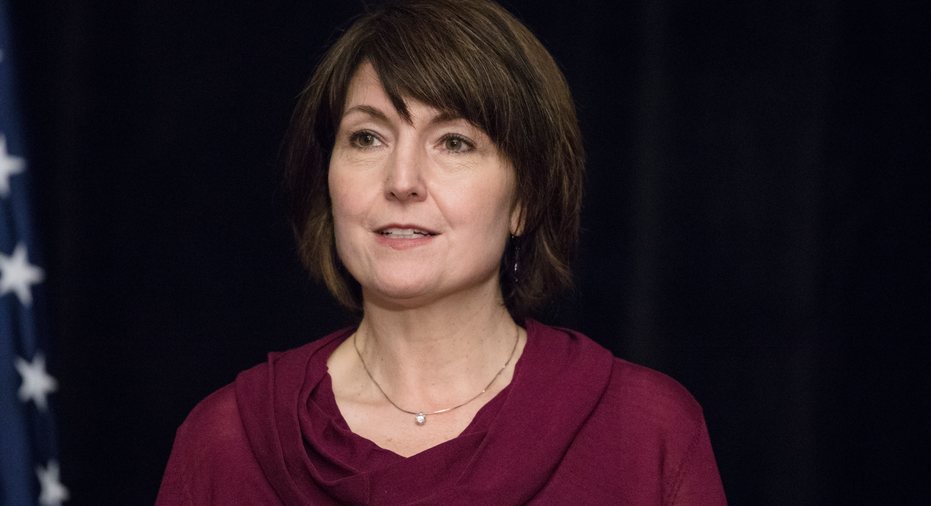Benefits of lobbying evident for small drugmaker

WASHINGTON – Tucked in the massive congressional budget bill is a provision that props up the price Medicare pays for a handful of medications, costing taxpayers millions at a time when the Trump administration is vowing to reduce the cost of prescription drugs.
Lawmakers acted after a lobbying campaign by a small Washington state pharmaceutical company called Omeros. Its main product is a drug called Omidria, used by hospitals in cataract surgery, which had recently lost a coveted Medicare reimbursement status. Individuals associated with the company also stepped up their political contributions.
Rep. Cathy McMorris Rodgers of Washington, the fourth-ranking House Republican, took the issue to Speaker Paul Ryan, R-Wis., securing a place for the drug provision in the 2,232-page spending bill signed Friday by President Donald Trump, aides said. The provision restores the drug's expired reimbursement status for two years, making it more lucrative for hospitals to continue using it.
The targeted provision succeeded even as broader health care measures failed to make the cut in the budget bill, from legislation to stabilize insurance premiums under the Affordable Care Act for millions of consumers, to a drug-industry backed effort to roll back recent changes that shift some Medicare costs to pharmaceutical companies.
The nonpartisan Congressional Budget Office estimates the pricing break for the Omeros drug and three products from other companies will cost taxpayers $26 million over 10 years, taking into account long-range effects.
Speaker Ryan and Rep. McMorris Rodgers said they acted to preserve patients' access to an innovative drug.
"This provision is the correct policy, was approved by both Republicans and Democrats involved in writing the bill, and was included at the request of members of our conference," said Ryan spokeswoman AshLee Strong. "To suggest any other reason is not only false but absurd and insulting."
Nate Hodson, a spokesman for McMorris Rodgers, said she pushed the measure "to provide patients across the country access to safe, innovative, life-changing drugs." Omidria is injected in the eye to prevent excessive shrinking of the pupil during cataract surgery and reduce pain afterward. Cataract surgery is usually an outpatient procedure.
Drugmaker Omeros had no initial response.
Some saw a disconnect in lawmakers' actions.
"At a time when policymakers are saying that they are interested in reducing drug costs this is a policy that runs counter to those talking points," said analyst Andrea Harris of the investment research firm Height Capital Markets. "This is a policy that maintains access to an innovative drug rather than putting downward pressure on drug prices."
Getting the change was major priority for Omeros and its CEO, Gregory Demopulos.
"Our frustration, shared by physicians nationwide, remains patients' restricted access to Omidria following its pass-through expiration on Jan. 1," Demopulos said in a recent press release about the company's financial performance. "Congressional and administrative efforts are ongoing, and we look forward to resolving this issue soon."
"Pass-through" is the technical term for the Medicare payment status that Omidria had lost. Pass-through allows Medicare reimbursement for the full cost of the drug, rather than packaging it with the cataract procedure. That creates an incentive for hospitals to use the drug instead of a lower-price substitute.
In the nation's capital, Omeros was pressing its case through lobbying and campaign contributions to prominent lawmakers by individuals associated with the company.
Omeros spent just over $1 million on lobbying in 2017, up from $645,000 a year earlier as the company brought aboard two new firms to make its case to Congress and the Trump administration, according to lobbying disclosure records filed with the House and Senate.
One of the new firms, The Nickles Group, was paid $275,000 to lobby lawmakers on "issues related to Medicare payment policy in hospital outpatient and ambulatory surgical center settings," the records show.
Omeros paid nearly the same amount to King & Spalding, a firm it hired in 2014, to press the House for the "reimbursement of outpatient medications."
In December, Rep. Dave Reichert, R-Wash., introduced legislation to address the issue. McMorris Rodgers was a cosponsor.
Individuals associated with the drug company ramped up their political contributions.
The political money website Open Secrets shows that Omeros CEO Demopulos donated $39,600 in the 2018 election cycle to the National Republican Congressional Committee, the campaign arm of House Republicans.
Federal Election Commission records show that Demopulos also donated $5,400 directly to Speaker Ryan's campaign on Aug. 31, 2017. Demopulos gave $5,000 to Ryan's political action committee, Prosperity Action Inc., on the same day.
Demopolus contributed $1,500 to Reichert in 2016.
Another company that's benefiting from the budget bill change expressed some puzzlement over the provision's inclusion.
Eli Lilly's imaging agent Amyvid is one of the three other products that will regain their lost Medicare reimbursement status. "Lilly was not focused on this being included in the omnibus bill," said spokesman Scott MacGregor.
___
Associated Press Health Writer Matthew Perrone contributed to this report.



















